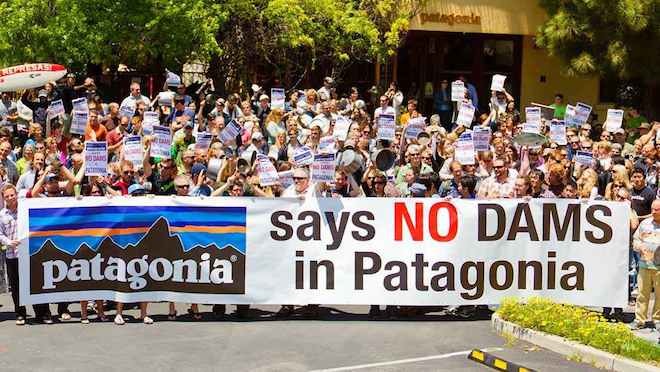
Patagonia is one of the leading companies for corporate activism, which B-schools are just now beginning to study. Patagonia photo
At the University of Southern California’s Marshall School of Business, global strategy professor Christine El-Haddad talks about outdoor clothing and gear company, Patagonia, often to her students. The business, she says, is a prime example of a brand that cares and isn’t afraid to stand up for what they believe in. “I’m not surprised by Patagonia’s move to challenge Trump’s decision in court,” El-Haddad tells Poets&Quants, referring to the Ventura, California-based company’s lawsuit filed December 6th.
On December 4, President Donald Trump announced that two national monuments in Utah, Bears Ears and Grand Staircase-Escalante would be reduced dramatically in size — Bear’s Ear by more than 80% and Grand Staircase-Escalante by more than half. The next day, Patagonia’s homepage lead image, usually a collage of wind, water, land, and adventure, was replaced with a large black block that filled screens worldwide. In stark white letters, it read: “The President Stole Your Land.” It still remains the first image on the site.
“As a Benefit corporation, Patagonia is committed to environmental and social causes. They are part of the company’s DNA,” El-Haddad says. But baking social and environmental outcomes into your company is one thing. Suing the President of the U.S. is another. But it’s already paid off. Literally. According reports from GQ, which obtained data from Slice Intelligence, a company specializing in online shopping insight, Patagonia sales by non-Patagonia retailers surged sixfold the day after the company placed the message on the site. For the entire week, sales jumped by 7% compared to the previous week, which included Cyber Monday.

Christine El-Haddad has been teaching strategy at the University of Southern California’s Marshall School of Business for a decade. USC Marshall photo
BRANDS HAVE BELIEFS, TOO — AND GET READY TO HEAR MORE ABOUT THEM
Critics called the move a marketing strategy to sell more fleece, but El-Haddad, who has been teaching strategy to undergraduates, graduates, and professions at USC for a decade, says the brand has a history of putting their beliefs first and believing sales will follow. While other companies largely stay out of thorny political issues and environmental policy, Patagonia has supported hundreds of grassroots organizations in their fight to protect public lands since 1985, and has donated more than $80 million to these groups, El-Haddad points out.
Thomas Gruen, the marketing chair at the Paul College of Business at the University of New Hampshire agrees with El-Haddad’s sentiments.
“When it comes to other companies, it can be integrated as a marketing strategy, but with Patagonia, it’s 100% consistent with the firm’s behavior over the last 40 years,” Gruen says. “The firm was built on being respectful of the environment and sustainability and they appear to be reinforcing with your customer base that they will continue to be consistent with your values.“
Either way, Patagonia’s tactics are igniting a trend known as CEO or corporate activism. Recently, more and more companies are letting their customers know that their brand has beliefs and values to stand for. El-Haddad believes that this is partly because consumers are taking to social media to express their frustrations, engaging with brands online, and demanding that they take a stand on issues they care about.
“Today, we are seeing more and more company CEOs making public statements on issues such as discrimination, gender pay equity, and climate change,” El-Haddad explains.
Gruen sees it the same way.
“Some companies are feeling the need for corporate activism because as an institution and company, they feel like they have responsibilities not to just stand on the sidelines,” he says.
Robert Strand, the executive director of the Center for Responsible Business at the University of California-Berkeley Haas School of Business takes it up a notch and says it’s increasingly the responsibility of business leaders to take social and environmental stands.
“The reality is that business are becoming increasingly influential and powerful and arguably even more powerful than governments today,” Strand says. “Combine that with the fact that we have an administration that has made some hurtful decisions, some businesses are recognizing that they have an opportunity and responsibility to step up and say this is wrong and we are going to do something about it.”
MILLENNIALS DIG CEO AND CORPORATE ACTIVISM
In March 2015, Apple CEO Tim Cook wrote in a Washington Post op-ed piece that anti-LGBT legislation was “very dangerous” and contrary to America’s founding principles when Indiana and Arkansas passed the controversial “religious freedom” bills that would allow discrimination against same-sex couples. In the same time period, Starbucks CEO Howard Schultz announced that he would be encouraging baristas to talk about race relations, in a campaign to help tackle racism, following the deaths of Trayvon Martin and Michael Brown at the hands of policemen. Researchers from Duke’s Fuqua School of Business and Harvard Business School “motivated people to buy from the company.”
This past July, public relations firm Weber Shandwick, in partnership with KRC Research, released a report titled “CEO Activism in 2017.” Their research found that 47% of millennials believed that CEOs had a responsibility to speak up on important issues, while only 28% of gen Xers and boomers agreed. Some 51% of millennials surveyed also said they were more likely to buy from a company whose CEO spoke out on an issue they agreed on and 44% of full-time millennial employees would be more loyal to their organization if their CEO took a public position on a hotly debated current issue.
REPUBLICANS DO NOT DIG (PATAGONIA’S) CORPORATE ACTIVISM
Of course, CEO activism doesn’t always mean increased brand awareness and popularity. Republicans quickly took to social media for backlash, accusing Patagonia of using the public lands debate “to sell more products to wealthy elitist urban dwellers.” El-Haddad says there are many factors that influence customer behavior and there’s always a risk of alienating customers who disagree with the stance taken.
Before taking any position, she says that leaders should understand the values of their primary customers and key stakeholders, monitor changes in the opinions and attitudes of their customer base, and have a plan in place to address potential negative sentiment to protect the brand. “When making a statement on a controversial issue, CEOs should clearly identify the reason they are making a public statement about the issue and how taking a stand relates to the company’s mission, values and business,” she says.
Patagonia explains in a dedicated page, the reason for the legal fight: “Patagonia has been in the fight to protect public lands for almost 30 years — and we are proud to have played a part in the establishment of several national monuments, including Bears Ears National Monument in Utah and Basin and Range and Gold Butte National Monuments in Nevada. We are also proud to stand alongside over 350 businesses, conservation groups and Native American tribes that have come together on this issue to protect public lands. Climbers, hikers, hunters and anglers all agree that public lands are a critical part of our national heritage and these lands belong not just to us, but to future generations.”
A CHANGE IN SALES WON’T BE PERMANENT
While customers may choose to buy one brand over another because of current affairs and corporate announcements, the change — good or bad — is not likely to be long-lasting as the media moves on to the next controversial issue.
“President Trump’s decision negatively impacts Patagonia’s business,” says El-Haddad, who feels the business had to take a strong stance. “As a designer of outdoor apparel and gear for sports like climbing and fishing, Patagonia — and the outdoor recreation industry as a whole — depend on public lands like national monuments and national parks that draw millions of visitors every year.”
It also negatively impacts the customers using Patagonia’s projects, which seems to be a dangerous combo.
“People that identify with Patagonia’s stand will dis-identify with an opposing stand, perhaps like with Trump’s policies towards the environment in this case. The statement they make by purchasing from Patagonia is an act of dis-identification against the commercialization of the National Monuments,” Gruen believes. “Patagonia‘s customer base is very heart loyal, compared to head loyal customers. They buy Patagonia because they love the brand and see it as who they are, not because it keeps them warmer or zips better. I’m not at all surprised that their customers have been energized by the company’s stand.“
Says Strand:
“The world is in search for aspirational models and stories now that we’re facing some dark times and challenges and much of this is related to the hateful rhetoric we hear at the highest level of our country. We need business folks like Patagonia CEO Rose Marcario who are stepping up to say no to the forces.”
DON’T MISS: SCHOOLS WITH THE MOST LIBERAL, MOST CONSERVATIVE STUDENTS or WHARTON STUDENTS TREK TO ANTARCTICA FOR LEADERSHIP TRAINING











Questions about this article? Email us or leave a comment below.